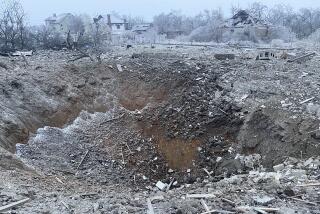Air War Is Still the Key
- Share via
President Clinton has not wavered on the use of NATO airpower to beat down the defenses of of Yugoslavia and vowed Thursday “to maintain and intensify attacks” on the military forces of Serbian leader Slobodan Milosevic. His determination came on the heels of an allied air assault that Belgrade claimed killed scores of civilians on a road in Kosovo. The Pentagon reported there was an attack in the area but did not confirm numbers of casualties.
“We and our NATO allies are in Kosovo today because we want to stop the slaughter and the ethnic cleansing,” the president told members of the American Society of Newspaper Editors in his San Franciso address. His point was to describe again the American commitment to NATO and Europe, and in doing so, he underlined that air power was the intended weapon.
That decision obviously comes with risks, but far less than those posed by ground action. The question is whether bombing and strafing can win the war. The word from Washington and NATO so far is that airpower will remain the dominant weapon.
Testifying Thursday before the Senate Armed Services Committee, Defense Secretary William S. Cohen and Gen. Henry H. Shelton, chairman of the Joint Chiefs of Staff, agreed that the air campaign will continue without letup for “many, many, many weeks or even months. Cohen added: “This is not going to be quick or easy or neat.”
Their underlying message at a time of public debate is that it will be the planes and pilots of NATO that will carry the load, not ground troops. That’s a strategy this page supports. As dangerous as the air war has been, a ground war at this stage would be far worse.
That was made clear by Times staff writers Paul Richter and Tyler Marshall in their Thursday report from Washington on what it would take for NATO to mount a ground campaign in Kosovo. Military officers and other warfare experts laid out the difficulties in simply getting troops to a battlefield.
Scenario 1: Some 10,000 to 20,000 NATO soldiers would be required to establish protective enclaves for the ethnic Albanian Kosovars.
Scenario 2: A campaign to seize most or all of the province from Yugoslav forces could take an estimated 60,000 to 100,000 troops.
Scenario 3: Several months of preparation and probably 200,000 NATO troops would be required to seize Belgrade, the Yugoslav capital.
The supply train for any of these options would be monumental, and planners estimate that Milosevic could probably finish his dirty work in Kosovo before NATO could mount its campaign. There are many cases for continuing the air campaign, not the least its debilitating effect on Yugoslav morale.
For these and other reasons Washington and NATO would be wise to work on plans for a ground campaign, but put their faith in airpower at present. It is not a perfect solution--nothing in war goes as planned--but raid by raid the NATO planes are making a point.
More to Read
Get the L.A. Times Politics newsletter
Deeply reported insights into legislation, politics and policy from Sacramento, Washington and beyond. In your inbox twice per week.
You may occasionally receive promotional content from the Los Angeles Times.










